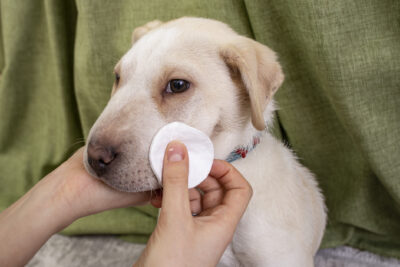Dental Treats for Dogs: 6 to Consider

All featured products are chosen at the discretion of the GreatPetCare editorial team and do not reflect a direct endorsement by the author or reviewer.
According to vets, daily tooth brushing is the most important thing pet parents can do to help prevent periodontal disease in dogs. However, as many of us know first-hand, life (and uncooperative canines) can often get in the way. Here’s hope: If you’re facing the occasional skip day, dental treats for dogs could help you keep your dog’s oral health on track.
While there’s no replacement for regular brushing and professional cleaning, dog dental chews and treats can play a role in your dog’s dental care. That’s because they can help reduce the plaque and tartar accumulation that causes dental disease.
Whether you reach for them in a pinch or to supplement your dog’s regular dental hygiene routine, here’s the scoop on dog dental treats. Plus, we asked vets about what to look for in dog teeth-cleaning treats and their top-recommended picks.
Dental Treats for Dogs: How Do They Work?

With the word “treats” right there in the name, it’s easy to assume that dental treats and chews are simply dog-safe breath mints. However, they do much more than help eliminate bad doggy breath.
“Although not as effective as brushing, the mechanical or chemical action of a dental treat can help reduce the amount of plaque and calculus build up on dog teeth,” says dental hygienist Kimi Kan-Rohrer, RDHAP, BSDH, at the University of California-Davis Veterinary Medical Teaching Hospital. “This, in turn, helps reduce the development of periodontal disease,” she adds.
Dog dental treats aren’t without their limitations. Even the best dog dental chews can’t fix damaged teeth. “They can’t treat more advanced dental issues like severe periodontal disease, abscesses, or tooth decay,” says Dr. Lisa Lippman, DVM, director of Virtual Medicine at Bond Vet. “Those require professional veterinary care.”
Using dental treats for dogs in tandem with regular brushing and professional veterinary cleanings is ideal. However, it’s not always feasible, acknowledges Dr. Don Beebe, DVM, DAVDC, co-founder of Apex Veterinary Specialists in Greenwood Village, Colorado.
For example, “Some pets have a strong aversion to direct tooth contact, ” Dr. Beebe explains. “Sometimes, it is the pet owner with the limitation. They may have poor compliance due to their schedule or perhaps a physical impairment that makes toothbrushing difficult.”
Types of Dog Dental Treats

Dog dental treats come in various shapes and sizes. And you may even know them by different names. On one hand, you’ll see dental treats and dental chews for dogs. But you may also see products like rawhide sticks, bones, or chews and wonder if they can benefit your dog’s dental health.
What’s the difference between these options for dogs? Here’s a quick breakdown to help you understand what to look for.
Edible Dental Treats for Dogs
Dog dental treats are typically designed to be chewed and digested. While the formulas vary, these treats typically contain ingredients like wheat flour, gelatin, corn starch, rice, chicken, and honey. So they are safe for canine consumption.
They may also contain chemical compounds, such as delmopinol hydrochloride or hexametaphosphate, to prevent plaque or tartar accumulation. Many have vitamins and minerals (like calcium) that aid in dental health.
You may hear these edible options called either chews or treats.
Dog dental chews can take the form of sticks, bones, toothbrushes, or any shape imaginable. They usually have a tough texture to encourage chewing and gnawing because that helps remove plaque and tartar. “Dental chews for dogs with a tougher texture can offer better mechanical cleaning action,” says Dr. Lippman.
Dog dental treats are typically smaller and bite-sized. They’re often not as tough, making them a good option for dogs who have difficulty chewing. You can even use some smaller dog dental treats as a food topper.
Non-Edible Bones, Sticks, and Chews

Rawhide is an example of a non-edible chewing treat. While studies show that chewing rawhide is an effective way to reduce plaque and tartar, it can be dangerous for dogs.
Rawhide “can be a choking hazard and harder for your dog to digest,” says Dr. Amber Karwacki, DVM, a partner doctor with Heart+Paw in Philadelphia.
If you choose to give your dogs these types of chewing treats, be aware that they aren’t formulated for dental benefits, like dog dental treats are. And always supervise your dog so they don’t ingest bits of rawhide.
Vet-Approved Dental Dog Treats
We considered a variety of dental chews and treats for dogs. And these are the top picks based on recommendations (or recommended product features) from veterinarians.
Our List
- Greenies Dental Treats for Dogs
- OraVet Dental Hygiene Chews
- C.E.T. VeggieDent Chews for Dogs
- ProDen Dental Care Dental Bites
- Pedigree Dog Treats Dentastix
- Purina DentaLife Dog Dental Chews
All our recommendations are available without a prescription. However, it doesn’t hurt to check with your veterinarian to be sure the product you’re considering is a good fit for your pup.
Dental Dog Treats: What to Look For

According to veterinarians, here are some things to keep in mind when shopping around for dental treats and chews.
Look for the VOHC label
The Veterinary Oral Health Council (VOHC) is a group of veterinary dentists and scientists appointed by The American Veterinary Dental College. They review pet dental products to see if they really work to reduce plaque and tartar.
If a product meets their standards, it gets the VOHC Seal of Approval. This seal tells pet parents and veterinarians the product is effective in promoting healthier teeth in pets.
To earn this seal, manufacturers must “complete clinical trials and provide research to prove their product reduces plaque and/or calculus (tartar) by at least 15 percent,” explains Dr. Kan-Rohrer.
If a product does not bear the VOHC Seal of Approval, that doesn’t necessarily mean it’s not effective, Dr. Kan-Rohrer adds. It could be that “they just haven’t submitted for VOHC review due to cost or lack of clinical trial data,” she notes.
Find options that fit your dog
Choose canine dental chews and treats that are appropriate for your dog’s size. “That way, you can avoid the risks that come with eating them too quickly or swallowing them whole,” says Dr. Kan-Rohrer. “These include choking, esophageal obstruction, and GI obstruction,” she warns.
Also, check the label for any ingredients that may trigger an allergic response in your dog or cause other health problems. For example, if your dog has thyroid issues, avoid chews with iodine-rich ingredients.
Ingredients to avoid
Veterinarians recommend avoiding treats containing excessive refined sugar because they can contribute to weight gain or other health issues. If your pet has food allergies, you should also avoid dental treats that contain ingredients that cause an allergic reaction.
Also, steer clear of products with xylitol or fluoride because they can be toxic to dogs (and cats), adds Dr. Kan-Rohrer. Treats that are approved for dogs should not have these ingredients.
Check the texture
Texture is an important feature of good dental chews for dogs. “Dental treats should be firm on the outside and chewy on the inside,” recommends Dr. Karwacki. The combo encourages your dog to bite on the treat multiple times, which helps scrape plaque and tartar from their teeth, she notes.
6 Best Dental Treats for Dogs that Vets Recommend

Greenies Dental Treats for Dogs
The plaque and tartar fighting power of Greenies Dental Treats for Dogs comes, in part, from their tough, chewy texture. The treats also feature distinctive grooves to promote chewing and prevent dogs from swallowing large chunks.
Greenies “are designed to be easily digestible,” says Dr. Lippman. “They also contain added ingredients that freshen breath.” (Their Fresh line contains natural dried spearmint.)
Greenies dog dental treats contain added nutrients like antioxidants vitamins A and E, and minerals, including calcium, which is essential for strong teeth. Best of all, Greenies has an extensive line of specialized dental treats, including Aging Care for older dogs and Weight Management.
Highlights
- The unique design promotes chewing activity and prevents dogs from swallowing large chunks.
- They contain added vitamins (like A and E) and minerals like calcium.
- Greenies Dental Treats for Dogs carry the VOHC Seal of Acceptance.
- The Greenies line comes in a wide variety of formulas, flavors, and sizes.
Things to Consider
- Greenies offers a sweet potato flavor variety. While antioxidant-rich sweet potatoes provide important nutrients, Dr. Beebe says these starchy treats could increase the risk of cavities in some dogs. “They may be okay if the pet’s teeth are brushed regularly,” he cautions.

Oravet Dental Hygiene Chews
These are among the best dog chews for teeth because they offer dual benefits, fighting bad breath and plaque at the same time. They also contain delmopinol hydrochloride, a chemical compound used in human dentistry.
“When added to a dental treat, this molecule helps make the tooth surface more slippery,” says Dr. Beebe. That helps by making it harder for plaque and tartar to accumulate. Oravet Dental Hygiene chews come individually wrapped for freshness.
Highlights
- This dual-action chew contains delmopinol hydrochloride, a compound that helps stave off plaque and tartar buildup.
- Each chew is individually wrapped for freshness.
- They’ve earned the VOHC Seal of Acceptance.
Things to Consider
- Oravet dog dental chews don’t come in as many varieties as some competitors.
- Individual wrapping of each treat contributes to waste.

C.E.T. VeggieDent Chews for Dogs
The signature Z-shape of this plant-based chew is by design. The unique shape makes it easier for the chew to reach (and clean) more areas of the dog’s mouth.
VeggieDent chews are one of the dog dental treats Dr. Karwacki recommends to pet parents. “These chews tend to hold up to some of the tougher chewers,” she says. They’re easily digestible and contain a prebiotic to promote gastrointestinal health.
The VeggieDent line isn’t just about dental health. You’ll find options that promote joint health and cognitive ability, too. An added plus: They’re manufactured by Virbac. So your purchase contributes to the company’s Every Pet Project, which donates $2,500 to two animal charities each month.
Highlights
- The unique shape makes it easier to reach more areas of the mouth.
- VeggieDent dental chews contain a prebiotic to aid in gut health.
- Available in unique formulations that focus on joint, gut, and mental health in addition to removing plaque.
- Seal of Acceptance from the VOHC.
- Virbac runs the Every Pet Project.
Things to Consider
- C.E.T. products are not as widely available in stores as some other better-known brands, and they’re a bit pricier.

ProDen Dental Care Dental Bites
These soft, small-sized dental bites can be a good option for dogs who have difficulty chewing. Another benefit: They contain sustainably sourced Scandinavian kelp that helps prevent plaque and calculus accumulation in dogs, according to one manufacturer-funded study.
While kelp is rich in antioxidants, feeding too much of it to a dog can lead to hyperthyroidism, due to its potent iodine content.
Highlights
- Good option to consider for dogs who have difficulty chewing.
- Formulated with an antioxidant-rich form of kelp that’s been studied for its effectiveness in removing plaque and tartar.
- These dog dental chews bear the VOHC Seal of Acceptance.
- ProDen dental treats are available as bites, soft chews, and “bones”.
Things to Consider
- Excessive kelp consumption can lead to hyperthyroidism.
- ProDen products are not as easy to find at retailers as some of our other recommended products.

Pedigree Dog Treats Dentastix
The key feature of the Dentastix chew is its deeply grooved, X-shaped design. According to the manufacturer, the unique shape makes it easier to clean hard-to-reach places in your dog’s mouth.
These treats feature calcium for strong teeth and beneficial vitamins like A, D3, and B. Dentastix chews are available in beef, chicken, and bacon flavors to tempt the most discerning of canine palates. They also have a minty flavor to help combat bad breath. The Pedigree Foundation donates millions of dollars to U.S. animal shelters and rescues.
Highlights
- The unique shape allows the chew to make its way to hidden areas of the mouth.
- Contains beneficial vitamins and minerals.
- Pedigree dog dental treats are available in a variety of flavors.
- They’re easy to find at retailers and are a more cost-effective option.
- The Pedigree Foundation supports U.S. rescues and shelters.
Things to Consider
- Though they’re made in the U.S., some of their ingredients are sourced from China and other countries.
- The only Dentastix product currently assigned the VOHC Seal of Acceptance is Pedigree Dentastix Advanced.
Purina DentaLife Dog Dental Chews
These porous dental sticks are ridged to promote chewing and plaque removal in difficult-to-reach places. They come in chicken flavor, with some varieties incorporating apple, pumpkin, and blueberry flavors into the mix.
The DentaLife line offers dog dental chews that promote immune health and digestion while also removing plaque buildup. They’re manufactured by Purina, a brand that provides grants to animal shelters and helps facilitate adoptions through its Purina + Petfinder Foundation.
Highlights
- Ridges in the chew make it easier to remove plaque in hidden areas of the mouth.
- Formulated with calcium.
- The DentaLife line includes dental chews that also target immunity and digestion.
- Has the VOHC Seal of Acceptance.
- Purina products are easy to find at retailers.
- Purina supports animal shelters and helps facilitate adoptions.
Things to Consider
- Some of their dog dental chews contain honey.
Tips for Using Dog Treats for Dental Care

Supervise your dog
Dr. Karwacki encourages pet parents to observe their dogs closely when giving them dental treats, especially in the beginning. That way, they can be sure their dog is chewing it appropriately and not attempting to swallow large pieces.
Monitor calorie intake
According to the Association of American Feed Control Officials (AAFCO), dog dental treats are not complete-and-balanced foods. So they should not be used in place of your dog’s regular diet. But if you’re adding them to your dog’s daily food intake, do so sparingly as some can be high in calories.
“To avoid weight gain, reduce the pet’s food intake proportionately to the calories provided by treats,” says Dr. Beebe.
Keep in mind that your dog’s normal diet should comprise at least 90 percent of their calories. Your dog should get no more than 10 percent of their calories from treats, which includes dental treats and chews.
Watch for signs of injury
In some cases, consuming too many dog dental treats can cause serious health issues. Dr. Beebe cites the risk of dogs developing pancreatitis, especially if the treats are high in fat. “If the product is excessively dense or hard, there is also a risk of tooth or gum injury,” he notes.
Such injuries could be even more serious for dogs with fractured teeth or those recovering from oral surgery, says Dr. Beebe. “Dogs with excessive chewing behaviors could potentially irritate gum tissues.” Dr. Lippman recommends checking your dog’s gums for irritation or injury after using a new dental treat.
Always remember, even the best dog teeth-cleaning treats can never replace consistent daily brushing and professional dental cleaning for your dog. If you’re ever in doubt about giving your dog dental chews or treats or need product recommendations, check with your veterinarian. When it comes to your dog’s dental or overall health, it’s always better to be safe than sorry.









